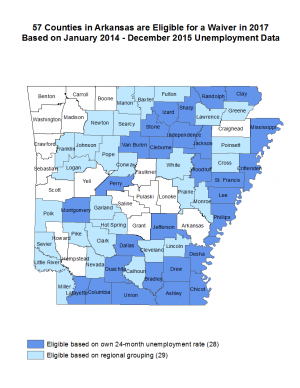
Note: This is part III of a three-part blog series on food insecurity and child hunger in Arkansas. Read part I here and part II here.
The Supplemental Nutrition Assistance Program known as SNAP is a federal food security program for individuals and families who are lower income and unemployed. Although this program is federally funded, states are given some flexibility on whether to enforce time limits for certain applicants. How states use that flexibility has a particularly large impact on single, childless adults who can’t find jobs.
One of the eligibility requirements for SNAP is that Able Bodied Adults Without Dependents (ABAWDs) can only participate in the program for three months every three years if they are unemployed or otherwise exempt. This is where state flexibility comes in. States with high unemployment can elect to waive this time limit. The idea is that in areas of high unemployment it is much harder to find jobs and meet the work requirements, and it makes sense to give people in those areas more latitude.
Arkansas previously used this waiver for the entire state, but Governor Hutchinson did not seek to reapply for the time limit waiver for 2016. This decision resulted in 12,000 Arkansans receiving notices that they would lose their SNAP benefits. Part of the reasoning for foregoing the waiver was that our state has a low unemployment rate overall. However, despite that overall low unemployment rate, there are still counties that have unemployment rates that are very high (close to 10 percent).
Since the job market is soft in these counties, they are eligible for county-specific waivers. Area-specific waivers allow states to focus the time limit exemption on places that have the most challenging job markets. There is more than one way for an area to qualify for a waiver, including having unemployment rates higher than 10 percent, or unemployment that is 20 percent higher than the national average. It is not too late for Arkansas to apply for waivers for the regions that need it most. Below is a map of Arkansas counties that could be eligible for a waiver in 2017.

Individuals can meet the work requirements despite the ABAWD time limit if they work at least 20 hours a week, work off their benefit by volunteering 26 hours a month or more, or go to a work training program. However, for people living in regions of Arkansas that still have very high unemployment rates, finding even a part-time job is difficult. Additionally, very few work training or volunteer options are available in more rural areas. Without a car or access to public transportation, traveling to different parts of the state to meet these requirements is an unreasonable requirement.
The vast majority of SNAP beneficiaries are honest people who are experiencing hard times (the fraud rate for SNAP is only 1.3 percent). This is lower than the fraud rate for most federal programs, and happens to be lower than the fraud rate for crop insurance. Instead of cutting off food programs for Arkansans who do not have work options, Arkansas should waive these work requirements for eligible counties and develop more work training programs and opportunities for employment in rural areas.
Miss the first two posts in this series? No problem. Read part I of this three-part series on child hunger in Arkansas here and part II here.
